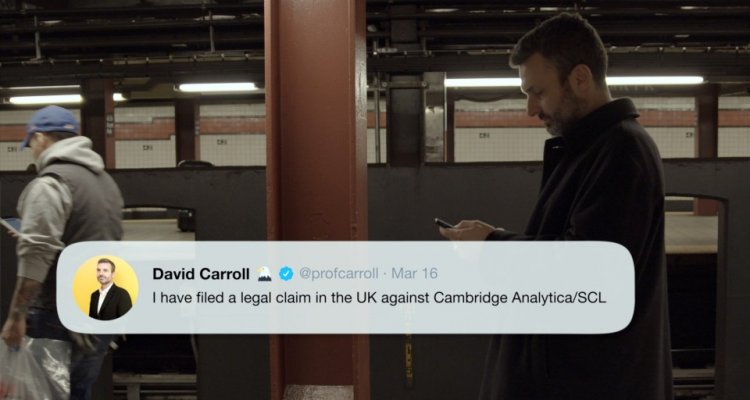It’s a sign of how quickly it feels like the world is being torn apart around us that even a ripped-from-the-headlines documentary, such as Karim Amer and Jehane Noujaim’s “The Great Hack,” can feel almost dated. The movie is, in part, an investigation of the ways by which British consulting firm Cambridge Analytica mined Facebook data to influence the 2016 U.S. presidential election for their client, the Donald Trump campaign, and also helped push a pro-Brexit agenda in the UK. It also wants to use that story as a catapult into the more expansive subject of how social media, despite the claims of Mark Zuckerberg and the like, doesn’t just fail in its claim to connect the world but actually does quite a lot to break it into squabbling, vicious factions.
READ MORE: The Best Films Of 2019… So Far
Like Noujaim’s earlier and far more memorable documentary “The Square,” this film is centered around a David-versus-Goliath story. The underdog heroes are people like media professor David Carroll and political consultant Brittany Kaiser. Both are fighting a legal and public-opinion battle against Cambridge Analytica, trying to bring to light both the firm’s unsavory methods and the ways in which it was allowed to harvest sensitive user data by Facebook. Unlike in those earlier efforts, though, Noujaim and Amer are working at something of a disadvantage as neither of their protagonists has much in the way of natural charisma.
READ MORE: The 100 Most Anticipated Films Of 2019
This should not matter, of course. And for some people, it won’t. For them, much of what is delivered in “The Great Hack” may come as a surprise or revelation. The documentary is bookended by an airy soliloquy from Carroll about how the “dream of a connected world,” in which online repositories would become the “guardian of our memory,” was soured by massive companies mining those data points to most profitably commoditize and weaponize people’s fears and desires. His worried ponderings are set against footage following him through a New York studded with animated renderings of how his digital footprint is being tracked, “Minority Report”-style. Halfway across the world, in a somewhat dramatically undisclosed part of Thailand, Kaiser—somewhat recently a director at Cambridge Analytica—is feeding elliptical bits of confessional information about the dirty secrets at her workplace to political theorist Paul Hilder.
READ MORE: Summer Movie Preview: 35 Films You Shouldn’t Miss
While much of what they are touching on is electrifying, they themselves come across in the movie as poor messengers. Even while doing important work in pushing a legal case in the UK demanding that Cambridge Analytica turn over his data that they harvested from Facebook, Carroll is presented as too much the self-involved academic pondering his latest theory. Kaiser, a problematic character whose flip from Barack Obama campaign worker to happy hanger-on with Steve Bannon’s jet setting fascist elite is too conveniently explained by her saying that nobody on the left would give her a paying job, comes across as more chaotic and opportunistic narcissist who now sees where the winds are blowing.
READ MORE: 11 Films To Watch In July: ‘Midsommar,’ ‘Once Upon A Time,’ ‘The Mountain’ & More
Despite the dramatic deficiencies of its main characters, “The Great Hack” does a couple of important things. First, it lays out a clear timeline of how Cambridge Analytica targeted so-called “persuadable” voters in key areas, overwhelmed them with targeted content designed to appeal to the psychological profiles built for them from data scraped from social media, and later pretended it did nothing untoward in either the Trump or Brexit campaigns. Second, it makes a strong case that its parent company, SCL, was a truly scary bunch who used military-grade psychological warfare tools to sew chaos around the world for various clients, in large parts by heightening precisely the blend of real-world apathy and blowtorch online vitriol currently infecting the world.
READ MORE: The 25 Best Film Festival Movies Coming Out In 2019 We’ve Already Seen
Of course, most of this has already been made clear in numerous print investigations, primarily by The Guardian’s truly fearless investigator Carol Cadwalladr. She is given due credit in “The Great Hack” for her work piercing the veil of secrecy behind Cambridge Analytica’s ugly methods and Facebook’s who-us? style of avoidance. (In fact, at the time of this writing, Netflix is facing a legal threat from a pro-Brexit campaigner incensed over certain allegations made by Cadwalladr in the movie.)
Nevertheless, her bracing and snappy reportage provides such a refreshing dash of cold reality, it unintentionally lays clear just how much the movie seems to wallow in the same kind of social media frenzy that it is supposedly critiquing. For all the time spent tracking various committee hearings at which Facebook and Cambridge Analytica are called to account, the movie spends far too much time watching people like Carroll, Hilder, and Kaiser react to things on screens or text people.
“Is this what we want?” Cadwalladr posits at a TED talk excerpted near the end. “To sit back and play with our phones as darkness falls?” She has already noted that she’s in the belly of the beast, speaking to the cream of the Silicon Valley crop. But at the same time, her apocalyptic message of damnation is not booed but met with rapturous applause. No doubt, the highly digital and highly concerned audience members enthusiastically liked her talk on Facebook afterward. Maybe they retweeted a few lines.
At some later point, that audience and others like them may well give “The Great Hack” a positive mention on one of their many platforms. Then, after feeding the data giants the price demanded for all that free access, they went right back to basking in the glorious echo chamber where everybody agreed that all this polarization and manipulation was terrible. Just terrible. [C+]

